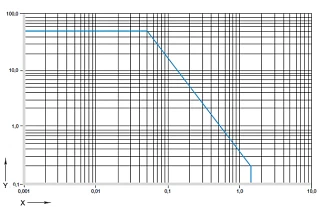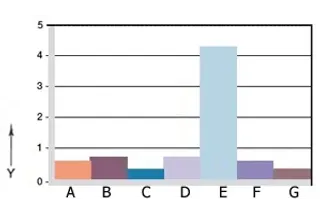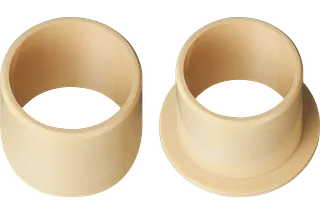Change Language :
iglidur® P210 - material data
The most important specifications at a glance
iglidur P210 plain bearings provide the user with versatile all-round bearings, which have proven to have above-average service life, primarily in pivoting applications at medium loads of up to 20MPa.
| Descriptive technical specifications | ||
|---|---|---|
| Wear resistance at +23°C | - 🟧 🟧 🟧 🟧 ⬜️ + | More information on wear resistance |
| Wear resistance at +90°C | - 🟧 🟧 🟧 🟧 ⬜️ + | |
| Wear resistance at +150°C | - 🟧 🟧 🟧 ⬜️ ⬜️ + | |
| Slide property | - 🟧 🟧 🟧 🟧 🟧 + | Coefficient of friction, dynamic, against steel, dry: µ 0.07 - 0.19 |
| Wear resistance under water | - 🟧 🟧 🟧 ⬜️ ⬜️ + | |
| Media resistance | - 🟧 🟧 🟧 ⬜️ ⬜️ + | More information on media resistance |
| Resistant to edge pressures | - 🟧 🟧 🟧 🟧 🟧 + | |
| Resistant to shock and impact loads | - 🟧 🟧 🟧 🟧 🟧 + | |
| Dirt resistance | - 🟧 🟧 🟧 🟧 ⬜️ + |
Temperature
Also thanks to its long-term application temperature of +100°C, iglidur P210 is suitable for a wide range of applications. If even higher temperatures are required, the bestseller iglidur G with a maximum long-term application temperature of 130°C is available. The temperatures prevailing in the bearing system also have an influence on bearing wear. The wear rises with increasing temperatures. Additional protection is required at temperatures higher than +50°C.
| min. application temperature | Upper application temperature, long-term | Upper application temperature, short-term | In addition secure axially from |
|---|---|---|---|
| -40°C | +100°C | +160°C | +50°C |
Permissible surface speeds
Plain bearings made from iglidur P210 are maintenance-free plain bearings that have been developed for low to medium surface speeds. The maximum values given in the table can only be achieved at very low surface pressures. The specified maximum speed is the speed at which an increase up to the continuous use temperature occurs due to friction.
Surface speeds of various iglidur materials
Information on pv value and lubrication
| Maximum surface speeds [m/s] | Rotating | Oscillating | linear |
|---|---|---|---|
| permanent | 1 | 0.7 | 3 |
| Short-term | 2 | 1.4 | 4 |
Permissible p x v values

Diagram 01: Permitted pv values for iglidur P210 plain bearings with 1mm wall thickness in dry operation against a steel shaft, at +20°C, installed in a steel housing
X = surface speed [m/s]
Y = surface pressure [MPa]
pv value, max. (dry)
MPa x m/s
0.4
Mechanical properties
The maximum recommended surface pressure is a mechanical material parameter. Conclusions about the tribology cannot be drawn from this. The compressive strength of iglidur P210 plain bearings decreases with increasing temperatures. Diagram 02 illustrates this relationship. Diagram 03 shows the elastic deformation of iglidur P210 under radial loads. Under the maximum recommended surface pressure of 50MPa, the deformation at room temperature is less than 3%.
Friction and wear
Like the wear resistance, the coefficient of friction μ changes with the load (diagram 04 and 05).
Coefficients of friction for iglidur P210 against steel (Ra = 1µm, 50HRC):
| iglidur P210 | dry | Greases | Oil | Water |
|---|---|---|---|---|
| Coefficient of friction µ | 0.07-0.19 | 0.09 | 0.04 | 0.04 |
Shaft materials

Diagram 06: Wear, rotating application with different shaft materials, p = 1MPa, v = 0.3m/s
X = shaft material
Y = wear [μm/km]
A = aluminium, hard-anodised
B = free cutting steel
C = Cf53
D = Cf53, hard-chromed
E = HR carbon steel
F = 304 SS
G = high grade steel
Diagram 06 shows results of testing different shaft materials with plain bearings made from iglidur P210. For rotational movements at radial loads below 1MPa, iglidur P210 has generally very low wear. Wear is only significantly higher in combination with HR carbon steel shafts. Generally, rotational wear will be higher than for a pivoting application of equal load. This is only reversed at loads above 25MPa.
Installation tolerances
iglidur P210 plain bearings are standard bearings for shafts with h-tolerance (recommended minimum h9). The bearings are designed for press fitting into a housing machined to a h7 tolerance. After installation into a nominal size housing, the inner diameter of the bearings automatically adjusts to the E10 tolerance. For certain dimensions, the tolerance deviates from this depending on the wall thickness (see product range).
Important tolerances according to ISO 3547-1 after press-fit:
| Diameter d1 [mm] | Shaft h9 [mm] | iglidur P210 E10 [mm] | Housing H7 [mm] |
|---|---|---|---|
| up to 3 | 0 - 0.025 | +0.014 +0.054 | 0 +0.010 |
| > 3 up to 6 | 0 - 0.030 | +0.020 +0.068 | 0 +0.012 |
| > 6 up to 10 | 0 - 0.036 | +0.025 +0.083 | 0 +0.015 |
| > 10 up to 18 | 0 - 0.043 | +0.032 +0.102 | 0 +0.018 |
| > 18 up to 30 | 0 - 0.052 | +0.040 +0.124 | 0 +0.021 |
| > 30 up to 50 | 0 - 0.062 | +0.050 +0.150 | 0 +0.025 |
| >50 to 80 | 0 - 0.074 | +0.060 +0.180 | 0 +0.030 |
| >80 to 120 | 0 - 0.087 | +0.072 +0.212 | 0 +0.035 |
| > 120 up to 180 | 0 - 0.100 | +0.085 +0.245 | 0 +0.040 |
Moisture absorption
Chemical resistance
iglidur P210 plain bearings have good resistance to chemicals. They are resistant to most lubricants. Most weak organic and inorganic acids do not attack iglidur P210.
All data at room temperature [+20 °C], + resistant 0 conditionally resistant - non-resistant
| Medium | Resistance |
|---|---|
| Alcohols | + |
| Greases, oils without additives | + |
| Hydrocarbons | - |
| Fuels | + |
| Diluted acids | 0 |
| Strong acids | - |
| Diluted alkalines | - |
| Strong alkalines | - |

Buy iglidur P210 products in the online shop
- Large selection of moulds and materials
- Available within 24 hours
- No minimum order value
- No minimum order quantity
Typical application areas
Consulting
I look forward to answering your questions
OEM Finland OY+358 207499499Write e-mail
Shipping and consultation
In person:
Monday to Friday from 7 am - 17 pm.
Saturdays from 8 am- 12 pm.
Online:
24h
WhatsApp-Service:
Montag – Freitag: 8 – 16 Uhr







